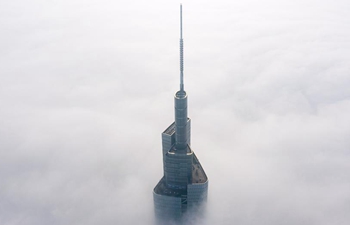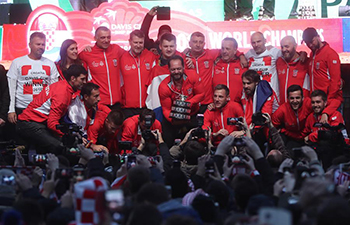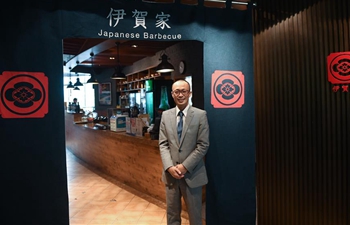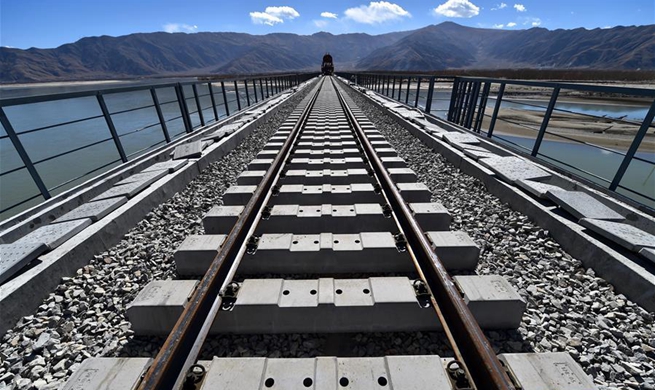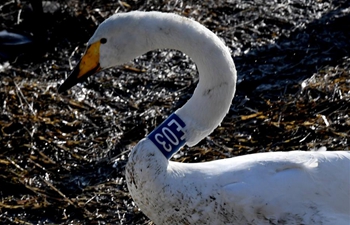WASHINGTON, Nov. 26 (Xinhua) -- In the latest criticism of the massive incentive package for Amazon, New York State Senator Michael Gianaris said the e-commerce giant's 14-month selection process for new headquarters has been a "charade," and it squeezed governments for subsidies it doesn't deserve.
"I am very much opposed to it," Gianaris said in local radio program "The Cats Roundtable" on Friday. "Amazon is probably the last company on earth that needs money," Gianaris said, denouncing the misuse of "public tax dollars."
Gianaris' remarks came 10 days after the Seattle-based company announced to locate its new headquarters in New York City and Arlington County, Virginia, a suburb of the capital city. Amazon's promise of 5-billion-U.S.-dollar investment and more than 50,000 jobs might sound appealing, but a total incentive package of over 2 billion U.S. dollars has drawn mixed reactions.
Virginia will grant 550 million dollars of direct incentives over 12 years as long as Amazon creates 25,000 jobs with an average wage of over 150,000 dollars in Arlington. New York State, meanwhile, will offer more than 1.5 billion dollars in credits and incentives if the company meets job creation and building occupancy targets, according to the company's press release.
A focal point of the discussion is whether the generous incentive package New York State and Virginia offered actually made a difference in Amazon's decision to select its second headquarters out of more than 200 candidates.
Gianaris, whose Queens District includes the Long Island city neighborhood where Amazon is located, believes that the company knew all along where it wanted to end up. "I think it's no surprise that they chose New York and Washington, D.C. This is the financial capital and the governmental capital of the country."
A recent study published by Michael Farren and Anne Philpot from George Mason University said that such subsidies worth billions of dollars are "unlikely to sway Amazon's decision." They said cities and states are "throwing their money away" when they court Amazon's favor through subsidies.
The authors noted that what some of the 20 semifinalists offered dwarfed what New York and Virginia offered -- for example, Maryland promised an 8.5-billion subsidy -- but the intensity of final negotiations only allowed Amazon to drive up the size of the subsidy.
The study concluded that other factors are more important in corporate location decisions, with the presence of a skilled workforce topping the list.
The Brookings Institution cited a 2017 survey showing that New York and Washington D.C. regions outpace other metro areas in terms of people working in computer and mathematical occupations, and said this is what made them competitive in the fierce bidding war.
Jeff Bezos, founder and CEO of Amazon, also highlighted the talent factor in making the final decision. "These two locations will allow us to attract world-class talent that will help us to continue inventing for customers for years to come," Bezos said.
In the radio program, Gianaris also mentioned a recent 20,000-job expansion in New York City by Google, which didn't get any incentives. "So why Amazon needs it while Google doesn't is simply a matter of bad policy and sacrificing when we don't have to sacrifice."
In an opinion piece released earlier last week, New York Governor Andrew M. Cuomo, however, spared no efforts to defend the incentives. "For high wealth individuals or large employee corporations, taxes would always be an economic decision point and several percentage points in tax rates makes a big difference."
Cuomo pointed out that every U.S. state offers incentives to attract businesses, and without the incentive, Amazon would not come to New York and would not bring their revenues or jobs. "The essence of the Amazon competition was that they were shopping for the best economic benefits."
Amazon is not alone in receiving massive incentives for bringing job opportunities. Last year, Apple decided to set up a 50-person data center in Iowa and was promised over 200 million dollars tax credits. Foxconn could be awarded over 3 billion dollars of tax credits and breaks for its new factory in Wisconsin, which could hire up to 13,000 people.
U.S. states and cities together offer an estimated 90 billion U.S. dollars of cash and tax incentives for big companies such as Amazon, according to the New York Times. But will it pay off?
In an earlier statement, Cuomo and New York City Mayor Bill de Blasio said the Amazon project is expected to create 13.5 billion U.S. dollars in city tax revenue over the next 25 years. "The project provides a 9:1 return on investment." Virginia Governor Ralph Northam also said earlier that the project will result in more than 3.2 billion in state revenue over the next 20 years after accounting for direct incentives.
David Reibstein, a marketing professor from Wharton School, University of Pennsylvania, told Xinhua that he thinks it is necessary for cities to cut deals for big companies. "Two billion is a big number, but I think it will pay for itself."
But the two professors from George Mason University don't agree. "Targeted economic development subsidies don't lead to broad-based economic growth or improvements in community welfare when measured against comparison cities," they said. " The major beneficiaries are the companies receiving the subsidies."
They believe that targeted tax cuts will distort the market forces of supply and demand, leading to lower economic efficiency. They suggested offering tax cuts for all companies instead.
Anyhow, local governments should conduct comprehensive research before making such decisions. "I would certainly hope that each of the cities did that detailed analysis before they offered the incentives they did," Reibstein said.
